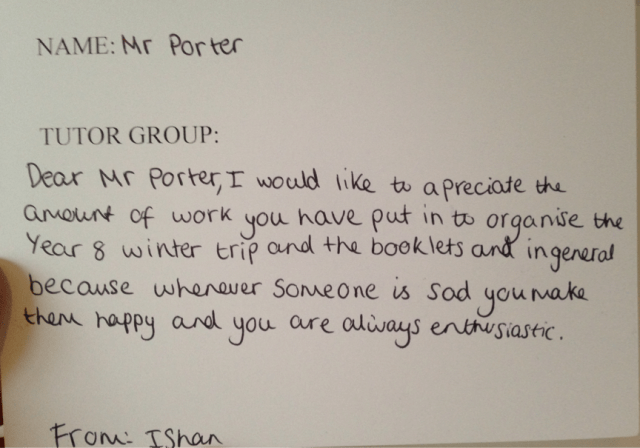“It is not happiness that makes us grateful. It’s gratefulness that makes us happy.
David Steindel-Rast
One way that schools can help their pupils to be happy in their lives is by teaching them the habit of gratitude.
At our school, we tell our pupils about what scientists are finding out about gratitude. It turns out those who regularly practise grateful thinking feel happier, more loving, optimistic, joyful and enthusiastic. As the world’s leading psychologist on gratitude says, ‘Gratitude is one of the few things that can measurably change our lives.’
Being grateful, though, is not effortless. At Michaela, we try to create opportunities for pupils to practise being grateful, so it becomes a habit. There are two main ways we try to do so.
Appreciations
Every day, we encourage every pupil at lunchtime to think of something they feel appreciative for, or someone they feel grateful to, and share why. Everyone is expected to think of acts of kindness to acknowledge and recognise. Pupils become more thoughtful and considerate when they’re actively reminding themselves of others’ efforts and appreciating them in person or around a lunch table.
‘I’d like to give an appreciation to Mr Smith for making his French lessons so fun and for teaching us to be confident in our accents.’
‘I’d like to appreciate Ms Lund for being an amazing form tutor and inspiring us to read challenging books!’
Thank-you notes
Every half-term, we encourage pupils to write a postcard to someone they’d like to thank. Here are a handful of the many notes that pupils wrote to teachers this Christmas:







Some of the most heart-warming times in teaching are when a child takes the time to thank you for making a small difference to them.
It also works both ways! Recognising, acknowledging and taking the time to write a postcard to thank a pupil for their often-extraordinary efforts makes both teachers and children feel happy.
Along with moment-by-moment interactions, small acts of kindness such as publicly appreciating them and writing thank you postcards, are lovely opportunities for showing our pupils how much we care.
When placed at the heart of the school ethos, small acts of gratitude are a promising way of helping children feel happy at school.
I love this post! Positivity and gratitude are so important to what we do in schools- so important for staff well being too. Thank you for posting this Joe.
each Wednesday we have a briefing in the main hall before school. Sharing T&L ideas; sharing whole school or national issue etc.
In July I emailed all 1500 students in school asking them which member(s) of staff they would like to say “thank you” to and why. I asked them not to tell anyone what was planned. Comments flooded in.
The final briefing if the term. Whole staff waiting in the hall. Cue cheesy music – “you lift me up” and the like and a PowerPoint presentation auto rolling with the comments from students thanking staff for things large and small.
Magic!
Pingback: Gratitude | Dr Mike Beverley
Love the cards. I echo the gratefulness.
Pingback: Blog: Showing Gratitude | Douglas Wise
Pingback: Willy Wonka and the DESC Factor: Being THANKFUL! | From the Sandpit....
Reblogged this on The Echo Chamber.
Pingback: Scales of Judgement | The Diary of a Not So Ordinary Boy
Reblogged this on Engaging Young Minds and commented:
The developing of wholesome young people.